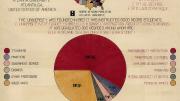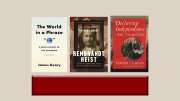“Much of the time we spend in gatherings with other people disappoints us,” warns professional facilitator Priya Parker, M.P.P. ’12. After this deflating introduction, The Art of Gathering: How We Meet and Why It Matters (Riverhead, $28) offers a breezy guide to running get-togethers of all shapes and sizes. Pointers include “the kindness of exclusion” (when it’s done well), a chart laying out the proper square-foot-per-guest allotment for dance parties, and an admonition: “Don’t be a chill host.”
Though at times his narration sounds tinny—“California lives on stories”; tech “put San Francisco at the center of the world”—Cary McClelland ’02, a lawyer and documentary filmmaker, mostly stays out of the way in Silicon City: San Francisco in the Long Shadow of the Valley(W.W. Norton, $26.95). He gathers interviews from a host of subjects, from a veteran cabbie to an Uber driver, with a venture capitalist, a tattoo artist, and community organizers in between. They describe a city changing so tectonically it unsettles even the rich. Returning to her hometown, one corporate lawyer reflects: “I’m gentrifying my own neighborhood. How weird is that?”
In the last year alone, renowned gay historian Martin Duberman, Ph.D. ’57, has published a memoir, a polemic about gay activism, and a “novel/history” about the inner circle of Kaiser Wilhelm. He adopts the third genre for Luminous Traitor: The Just and Daring Life of Roger Casement, A Biographical Novel (University of California Press, $32.95): cleaving to the historical record and using “informed speculation” to fill in the gaps. Casement, who exposed colonial abuses in the Congo and Peru, and was executed for his role in the Easter Rising, cut a colorful figure. Duberman argues that until recently, biographies have tended to underplay, censure, or disparage his homosexuality and promiscuity—“thereby skirting certain essential ingredients in Casement’s startling contemporary relevance.”
Meanwhile, on the dating scene, “What’s your type?” is the new “What’s your sign?” But singles aren’t the only ones clamoring for a “people-sorting device.” As Merve Emre ’07 points out in The Personality Brokers (Doubleday, $27.95), schools, employers, and even hospitals and churches use the Myers-Briggs Type Indicator to scry human behavior. Emre offers a sweeping account of the personality testing phenomenon, from its creation by Katherine Myers, an ardent devotee of Carl Jung, and her daughter Isabel Briggs, a housewife and murder-mystery writer; to its deployment in the Cold War; to its current status as a $2-billion-dollar industry.
In 2015, authorities jailed the “Feminist Five,” a group who’d planned to hand out stickers against sexual harassment on Beijing’s public transit. Their detention became an international cause célèbre and, writes Leta Hong Fincher ’90, a turning point for women’s rights in China. Betraying Big Brother: The Feminist Awakening in China (Verso, $26.95) shows how the movement has risen on social media and taken root abroad and in cities like Guangzhou. Hong Fincher argues that the Chinese Communist Party relies on patriarchal crackdowns for its post-Soviet survival—and, further, that “anyone concerned about rising authoritarianism globally needs to pay attention to what is happening in China.”
In the roving nonfiction collected in Impossible Owls: Essays (FSG Originals, $15), Brian Phillips ’99 gets lost in Tokyo while reporting on a sumo wrestling tournament and learns to (safely) crash-land a plane while en route to the Iditarod, among other escapades. His stories feel boyish in the best sense: fresh-faced and adventuresome, casually funny or lyrical as the moment demands. “Everybody pretty jaded here? Fantastic,” he writes, describing a polar bear. “I couldn’t feel my spine, she was so beautiful.”
A Carnival of Losses: Notes Nearing Ninety (Houghton Mifflin Harcourt, $25), the last book by the late Donald Hall ’51, JF ’57, has the air of a rambly chat after a long meal. As the former U.S. poet laureate puts it: “Why should the nonagenarian hold anything back?” Much of the collection sweeps up stray anecdotes from a life in letters; other essays face mortality, relaying what it’s like to lose his hearing (gradually) and his teeth (several times daily). The centerpiece is a remembrance of his wife, the poet Jane Kenyon, observing that “Poetry begins with elegy, in extremity, as Gilgamesh laments the death of his companion Enkidu, watching worms crawl out of Enkidu’s neck.” And just as verse miraculously does, this book finds grace.
Hollywood Math and Aftermath (Bloomsbury Academic, $116.99) is a wonkish tour of the recent history of showbiz. “Money is Hollywood’s great theme—but money laundered into something else, something more,” argues J.D. Connor ’92, an associate professor in the division of cinema and media studies at the University of Southern California. Close-reading the films and the industries that created them, he shows how the financial crisis shocked moviemaking in the Obama era, and why it’s central to understanding work as various as The Incredible Hulk and Upstream Color.
Most know W.E.B. Du Bois, A.B. 1890, Ph.D. ’95, through his writing; now comes a chance to page through his eye-popping infographics. For an exhibition in Paris in 1900, Du Bois and his students at Atlanta University hand-drew charts that inventively displayed migration patterns, property ownership, and other facets of African-American life. W.E.B. Du Bois’s Data Portraits: Visualizing Black America (Princeton Architectural Press, $29.95), edited by Whitney Battle-Baptiste and Britt Rusert, collects them in full color.
For some light back-to-school reading, two thrillers dripping Crimson. Paul Collins’s Blood and Ivy (W.W. Norton, $26.95) is true crime told like a novel, about an 1849 murder at Harvard Medical School. The Ancient Nine (St. Martin’s Press, $27.99), is a novel prefaced, coyly, by author Ian Smith ’91: “Based on real events.” It follows an undergraduate from Chicago’s South Side through the harrowing pledge process for the Delphic Club.









